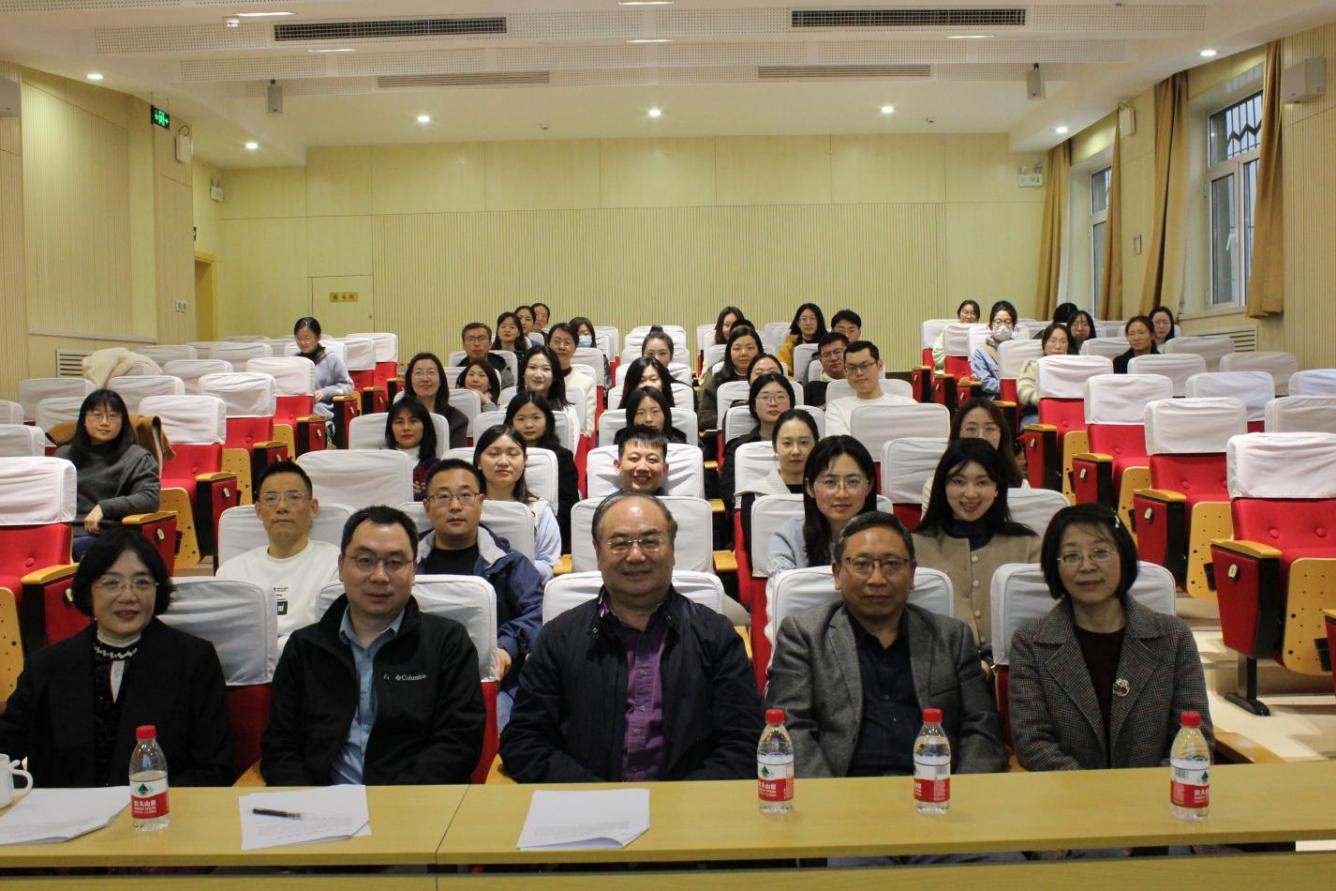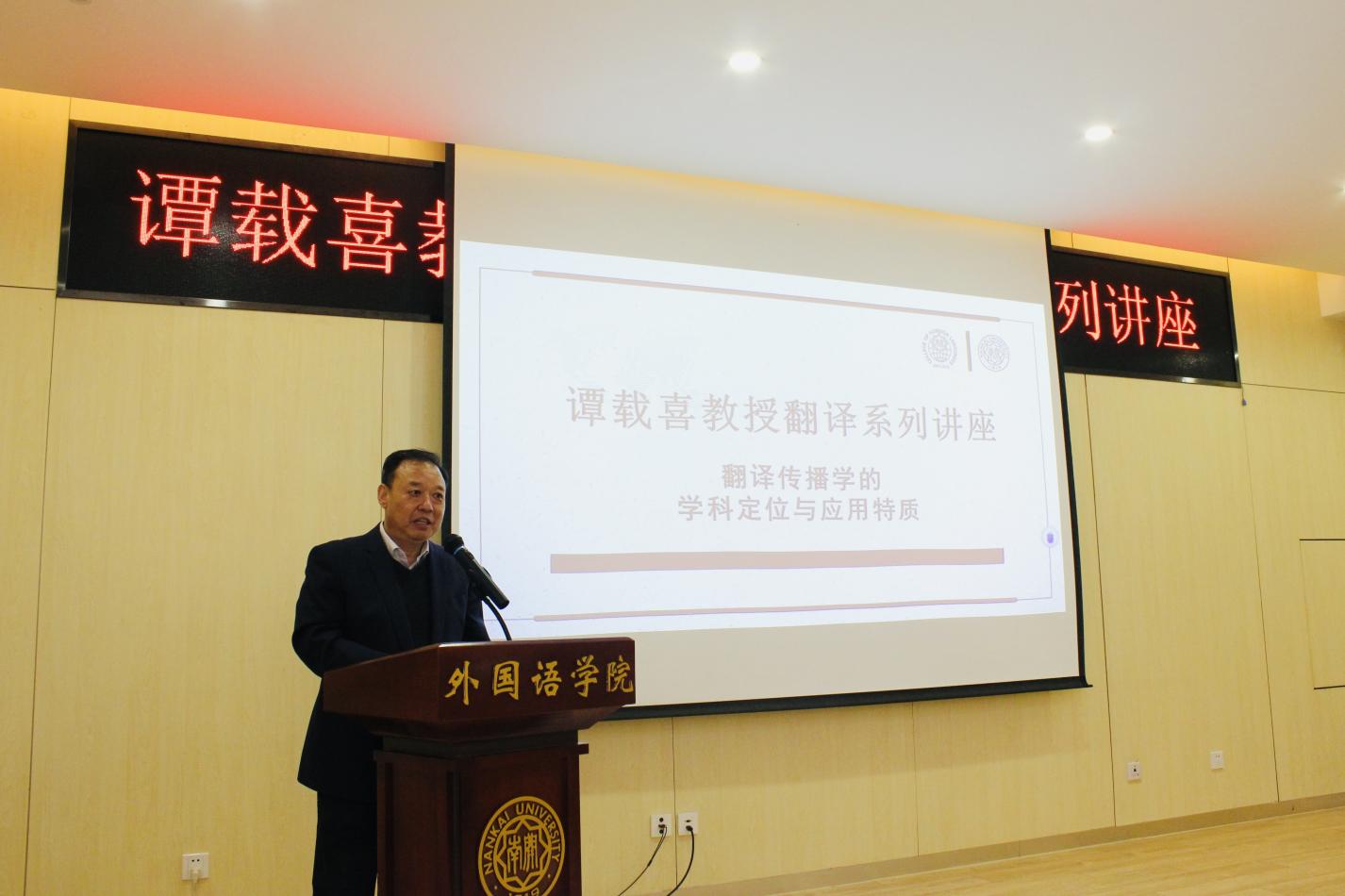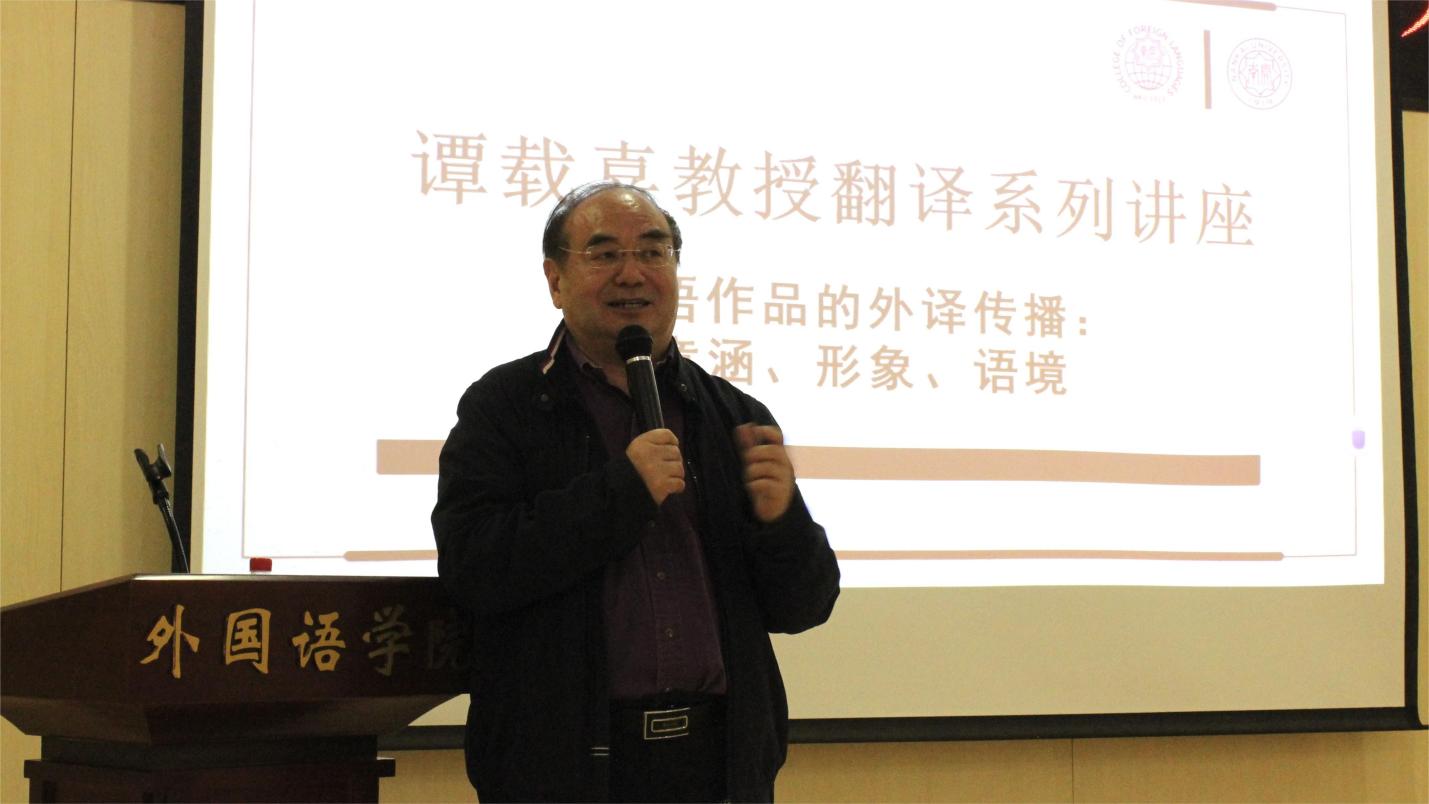From April 9 to 10, 2024, at the invitation of the School of Foreign Studies at Nankai University, Professor Tan Zaixi, Professor Emeritus of Hong Kong Baptist University, Professor at the School of Foreign Languages of SZU, Honorary Professor at the School of Foreign Languages of SZU, and Doctoral Supervisor, who had previously served as a Distinguished Professor at SZU and as a Lecturer at Beijing Foreign Studies University, delivered a series of two lectures on translation to all students of the School. Professor Yan Guodong, the Dean of the School of Foreign Studies at Nankai University, Professor Zhang Zhizhong, the Head of the Department of Translation, Professor Hu Cui’e from the Department of Translation, Professor Emeritus Miao Ju from the Department of English, and Associate Professor Zhang Qiang from the Department of Translation attended the lectures. The two lectures were not only attended by our teachers and students but also drew participants from undergraduate and graduate schools of other institutions, including Beijing Foreign Studies University, Tianjin Normal University, and Tianjin Foreign Studies University.

Tan Zaixi is a Professor Emeritus at Hong Kong Baptist University and the School of Foreign Languages at Shenzhen University. He also served as a Distinguished Professor at the School of Foreign Languages of SZU from 2018 to 2021, a visiting Professor at Beijing Foreign Studies University from 2018 to 2021, and a Ph.D. supervisor. He was a Senior Research Fellow in the Department of Chinese, Linguistics, and Translation at the City University of Hong Kong. He also served as the Director and Professor of the Department of Translation, Interpretation, and Intercultural Studies (formerly the Translation Studies Programme) at Hong Kong Baptist University. Additionally, he was a member of the Council at Hong Kong Baptist University, a member of the Appeal Board on Exemption from the Language (English) Proficiency Requirement at the Hong Kong Education Bureau, a special trainer at the Department of Official Languages of the Civil Service Bureau of Hong Kong for Chinese-English translation, a special reviewer for the Hong Kong Certificate of Education Examination, and a specialized examiner for the Hong Kong Civil Service Examination (English). He has published a total of 16 books and translations, with 3 more forthcoming. His works include “Translation Studies” (New Edition) scheduled for release in 2024, and “Translation Studies: Selected Academic Papers by Tam Jai-hei” also expected in 2024. He has published more than 200 papers, including 30 in English, in international and domestic journals focusing on major translation studies. He has published more than 200 papers, including 30 in English, in major international and domestic translation research journals.
The theme of the afternoon lecture on 9 April was “Communication via Translation: Disciplinary Positioning and Features Application,” which was hosted by Professor Zhang Zhizhong, Dean of the Department of Translation. Professor Yan Guodong, Dean of the School of Foreign Studies, warmly welcomed and sincerely thanked Professor Tan Zaixi for visiting Nankai University. Professor Yan introduced the tradition and history of translation discipline at the School of Foreign Studies, Nankai University to guest speakers, teachers, and students from various departments. Additionally, he shared Professor Tan Zaixi’s personal biography and academic accomplishments.

Professor Tan Zaixi first thanked the School for the invitation and warm reception. In the subsequent academic discussion, Professor Tan Zaixi explored the fundamental characteristics of the discipline in the Chinese context by examining and analyzing Chinese and English literature. He compared different perspectives in the English context, delved into the disciplinary development and theoretical reflections, and its practical applications at different levels. This was done to elucidate the validity, viability, and methodology of theoretical analysis in Translation and Communication, and the establishment of the discipline. According to Professor Tan Zaixi, translation communication involves not only linguistic and cultural exchange or communication but also cultural-political communication. In the process of translation communication, the translator must uncover and convey the underlying cultural-political significance of the text through the apparent linguistic and cultural elements of the text and discourse. This is the primary purpose and mission of translation communication. Finally, Professor Tan Zaixi uses translation communication in the 2021 US-China High-Level Strategic Dialogue as an example to demonstrate the significance and practical application of translation communication theory in the actual work.

In the afternoon of 10th April, Professor Tan Zaixi delivered another lecture titled “Translation and Communication of Mother Tongue Works: Connotation, Image, Context”. The lecture was hosted by Professor Hu Cui’e from the Department of Translation. Taking the strategy of Chinese cultural expansion as the backdrop of the lecture, Professor Tan Zaixi focused on how to effectively translate and disseminate native language works amidst the evolving landscape of globalization. The discussion revolved around theoretical contemplation and discourse on the key aspects encompassed by this topic. He emphasized the importance of not only focusing on internal research, which involves analyzing the linguistic and cultural-political implications of translating and disseminating works in the mother tongue or external languages but also considering the country’s requirements. It is crucial to pay attention to the connection between translation and dissemination and formation of the national image, as well as the operational characteristics of translation and dissemination institutions within Chinese context. This approach will contribute to the advancement of translating and disseminating works in the mother tongue and associated research in the current scenario.

Professor Miao Ju, Professor Emeritus of the English Department at the School, commented on the first lecture. Miao Ju stated that the development of translation and communication studies is crucial for effectively spreading Chinese culture worldwide, sharing Chinese narratives, and elucidating and promoting exceptional culture with Chinese characteristics. This endeavor embodies the Chinese spirit and encapsulates Chinese wisdom. In his response, Professor Tan Zaixi pointed out that the disciplinary orientation of translation and communication still encompasses the essential features of translation, linguistic transformation, reciprocity of meaning, multimodal meaning generation and enhancement, and the influence of multiple factors. The construction of the system of translation and communication science is based on the profound connotation inspired by the 5W model and 7W system of communication science elements. This will enhance the integrated development of national translation capacity and international communication capacity building.
Professor Hu Cui’e from the Department of Translation commented the second lecture. She affirmed the contemporary significance of the translation of Chinese works elaborated by Professor Tan Zaixi. She found the two guiding opinions put forward by Professor Tan on the translation and dissemination of works in the mother tongue very inspiring. First of all, the translation of culturally loaded words can reflect the differences in language, but the core meaning of the translated culture cannot be easily altered. Moreover, the translator should adopt flexible translation strategies to promote the exchange and communication of Chinese and foreign cultures in a negotiated translation. Furthermore, translators should adopt a flexible translation strategy and promote the exchange of Chinese and foreign cultures through negotiated translation.
Finally, during the interactive segment of the two lectures, teachers and students delved deeply into topics such as the evolution of translation in Hong Kong, the constructivist perspective on translation, and translation strategies for capturing cultural nuances in words. Professor Tan Zaixi provided insightful responses to each topic, leaving teachers and students feeling enriched and greatly benefiting from the discussions. The two lectures focused on specific topics, theoretical, and applied, providing both breadth and depth. The lectures featured vivid presentations and lively exchanges and interactions, achieving excellent results.



